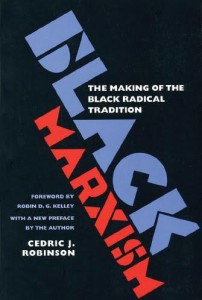 A few days ago my fellow USIH blogger Robert Greene posted something to my Facebook wall about Cedric J. Robinson’s classic book, Black Marxism: The Making of the Black Radical Tradition. We proceeded to have a brief conversation about how important, indeed underrated Black Marxism is, and I declared I would re-read and blog about it in the near future. Alas, this is not that post, but I will say that in my first reading of Black Marxism while in grad school (while in the midst of a serious Marxist reading binge), I was struck by Robinson’s argument that classic Marxist theories about the emergence of capitalism ignored the role of race. Or as Robin D.G. Kelley puts it in a foreword he wrote to a later edition of Black Marxism: “Capitalism and racism… did not break from the old order but rather evolved from it to produce a modern world system of ‘racial capitalism’ dependent on slavery, violence, imperialism, and genocide.”
A few days ago my fellow USIH blogger Robert Greene posted something to my Facebook wall about Cedric J. Robinson’s classic book, Black Marxism: The Making of the Black Radical Tradition. We proceeded to have a brief conversation about how important, indeed underrated Black Marxism is, and I declared I would re-read and blog about it in the near future. Alas, this is not that post, but I will say that in my first reading of Black Marxism while in grad school (while in the midst of a serious Marxist reading binge), I was struck by Robinson’s argument that classic Marxist theories about the emergence of capitalism ignored the role of race. Or as Robin D.G. Kelley puts it in a foreword he wrote to a later edition of Black Marxism: “Capitalism and racism… did not break from the old order but rather evolved from it to produce a modern world system of ‘racial capitalism’ dependent on slavery, violence, imperialism, and genocide.”
The timing of Robert’s intervention was fortuitous because I’ve been thinking about the role of black Americans in relation to my larger research question about Marx and America. Such thinking came to a head when I saw this short article in the Guardian about a new London exhibit of Soviet propaganda posters that sought to convince Africans and African Americans to commit to communism in general and the Soviet Union in particular by juxtaposing the racial harmony of socialist utopia with the cruel racism found in the United States. Indeed many black activists joined the Communist Party in the 1930s because it had taken a more radical stance with regards to civil rights than any other party in the United States, something that Kelley shows in his own classic book, Hammer and Hoe: Alabama Communists during the Great Depression. Of course, as Harold Cruse pointed out in his 1967 tome, The Crisis of the Black Intellectual, blacks who joined the Communist Party often had to submerge their immediate demands for racial justice in their commitment to the cause. So the history of black Americans and the Communist Party (not to mention the history of black Americans and Marx) is vexed and needs further exploration. In the meantime I will leave you with some of the beautiful images of the Soviet racial harmony propaganda posters, lifted from the Guardian. This aesthetic speaks to my inner soul!











3 Thoughts on this Post
S-USIH Comment Policy
We ask that those who participate in the discussions generated in the Comments section do so with the same decorum as they would in any other academic setting or context. Since the USIH bloggers write under our real names, we would prefer that our commenters also identify themselves by their real name. As our primary goal is to stimulate and engage in fruitful and productive discussion, ad hominem attacks (personal or professional), unnecessary insults, and/or mean-spiritedness have no place in the USIH Blog’s Comments section. Therefore, we reserve the right to remove any comments that contain any of the above and/or are not intended to further the discussion of the topic of the post. We welcome suggestions for corrections to any of our posts. As the official blog of the Society of US Intellectual History, we hope to foster a diverse community of scholars and readers who engage with one another in discussions of US intellectual history, broadly understood.
Just wanted to say thanks for this post–there’s still much to be said about the relationship between African Americans and the American Communist Party (and of course the international Communist movements too).
I think it’s also worth thinking about the lineage of African American activism tied to Communism and how this changes over time–most notably, thinking about the actions of folks such as Angela Davis as the Cold War came to a close. There’s much to think about–looking forward to seeing more of what you argue down the road!
Thanks for these wonderful images, Andrew!
I also wanted to note that Cedric Robinson’s first book, Terms of Order: Political Science and the Myth of Leadership has just been re-released, so perhaps there is a larger Robinson revival under way!
Ooooh thanks for the heads up!